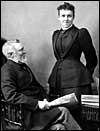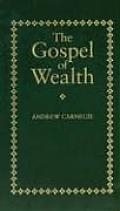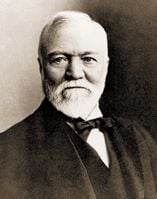 |
| Andrew Carnegie with his wife, Louise (http://www.pbs.org/wgbh/amex/carnegie/) |
Though Clark Kent may have been able to stop a speeding bullet, Andrew Carnegie was the real man of steel. A prominent American entrepreneur during the Industrial Age, Carnegie led the American steel industry from 1873 – 1901 (Hacker). Born in Dunfernline, Scotland in 1835, Carnegie and his family moved to Allegheny, Pennsylvania in 1848 for a better life (Hacker). Starting as young man, he worked for the Pennsylvania Railroad for 12 years (Gale Encyclopedia of U.S. Economic History). After his railroad work, Carnegie found an interest in steel, and he founded the J. Edgar Thomson Steel Works, later to be named the Carnegie Steel Company (Gale Encyclopedia of U.S. Economic History). Meanwhile, Carnegie married Louise Whitfield in 1887, one year after his mother’s death, and in 1897, their first and only child, Margaret, was born. During the late 1800’s and after his retirement in 1901, Carnegie devoted time to philanthropy (Hacker). In 1889, he wrote a piece entitled Wealth, in which he urged the rich to be generous to the community and to others (Dalzell). Andrew died in 1919 at his summer home near Lenox, Mass.(Hacker). During his lifetime, Carnegie donated about 350 million dollars of his enormous wealth to many public libraries and numerous institutions (Hacker). He was a man who strived to keep peace, worked for the common good, and taught others through philanthropy.
 |
| New York's Carnegie Hall (http://mysticplanet.com/IDA/CarnegieHall2.jpg) |
Carnegie cared greatly for the welfare of others. Carnegie showed his consideration when that he acquired Homestead region of his company. Three years after obtaining Homestead, Carnegie wrote a piece that recognized the worker’s right to practice civil disobedience: “in 1886 he declared that workers had…the right to strike, as long as the action was peacefully conducted; management on its part was to…make no effort to use strikebreakers…Strikes, he said, should not degenerate into warfare but were to be regarded as trials of strength, with peaceful negotiation terminating the contest” (Hacker). Carnegie wanted to retain peace within his company’s environment. He didn’t resort to violence not only for the sake of keeping the peace within his empire, but he also genuinely cared for other’s well-being. Also, Carnegie’s men were not the only ones to whom Carnegie cared. After his work in steel, Carnegie donated a large portion of his fortune in endowments: “He eventually funded 2,509 public libraries throughout the English-speaking world, built the famous Carnegie Hall in New York, and founded the Carnegie Institute of Technology, which later became Carnegie-Mellon University. In 1905, he established the Carnegie Foundation for the Advancement of Teaching, and in 1910, he formed the Carnegie Endowment for International Peace. In 1911 he founded the Carnegie Corporation of New York, which continued his philanthropic legacy after his death. Throughout his lifetime Carnegie distributed some $350 million towards the public good” (Gale Encyclopedia of U.S. Economic History). Carnegie exhibited extremely generous characteristics. He cared greatly about education, and he wanted children to have the opportunity to be successful, and success usually results from having and formal education. His endeavor was an honorable one - to keep the American dream alive through the next generation. Carnegie also wanted to share his ideas with others, and he did this through the use of philanthropy.
 |
| Wealth was later published as the Gospel of Wealt (http://content-1.powells.com/) |
During the late 1800’s and after his retirement, Carnegie devoted time to philanthropy. Carnegie wrote a piece called Wealth in 1889: “In this piece Carnegie addressed the problem of the "proper administration of wealth" and outlined his vision of a socially responsible capitalist. He argued that it was the duty of the rich to administer their surplus wealth for the common benefit. "The man who dies thus rich dies disgraced," he wrote” (Gale Encyclopedia of U.S. Economic History). Not only did Carnegie donated a lot of money to the common good, but he believed that a rich man’s responsibility to share money to the community. He even identified a wealthy man’s fortune to be surplus, thinking that one man doesn’t need a large amount of money. Carnegie once said that "the man of wealth must act as "trustee and agent for his poorer brethren, bringing to their service his superior wisdom, experience, and ability to administer, doing for them better than they would or could do for themselves" (Dalzell). Carnegie urged others to help their fellow man, not only through donations, but also through advice and wisdom. I also agree with him when he mentions that you should put others before yourself.
 |
| Andrew Carnegie in his later years (http://www.awardannals.com/) |
Carnegie was a man of peace and charity. He didn’t focus on material things as many other wealthy people. He believed that violence was barbaric, and thought that peaceful negotiation should be the means for settling a dispute. Andrew Carnegie is hero, because he invested not only in steel, but also in the industry of education, which, as he realized, would shape the next generation. Also, the lessons he taught in philanthropy inspire others to care for the well-being of others, especially those less fortunate than themselves.
 |
| Carnegie Mellon University (http://farm1.static.flickr.com/) |
Works Consulted
"Carnegie, Andrew (1835-1919)." Gale Encyclopedia of U.S. Economic History. Ed. Thomas Carson and Mary Bonk. Detroit: Gale Group, 1999. Student Resource Center - Gold. Gale. DEL NORTE HIGH SCHOOL. 10 May. 2010
"Carnegie, Andrew (1835-1919)." UXL Biographies. Online ed. Detroit: UXL, 2003. Student Resource Center - Gold. Gale. DEL NORTE HIGH SCHOOL. 7 May. 2010
Dalzell, Frederick. "Carnegie, Andrew (1835-1919)." American Eras, Volume 8: Development of the Industrial United States, 1878-1899. Ed. Vincent Tompkins. Vol. 8. Detroit: Gale Research, 1997. Student Resource Center - Gold. Gale. DEL NORTE HIGH SCHOOL. 11 May. 2010
Hacker, Louis M. "Carnegie, Andrew (1835-1919)." Encyclopedia of World Biography. Ed. Suzanne M. Bourgoin. 2nd ed. Detroit: Gale Research, 1998. 17 vols.Student Resource Center - Gold. Gale. DEL NORTE HIGH SCHOOL. 5 May. 2010
Page created on 5/28/2010 12:00:00 AM
Last edited 5/28/2010 12:00:00 AM
